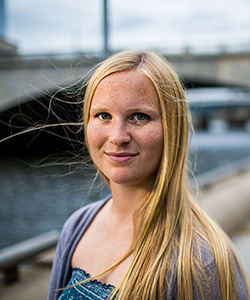
“I’ve always loved nature, but I never thought I could turn that passion into a career,” says Jillian Adair, a junior in Drexel’s Department of Biodiversity, Earth and Environmental Science.
The once skeptic took a 12-week adventure last summer with the Sea Education Association, studying marine science and maritime history, and then sailing around New Zealand.
“It was absolutely amazing,” Adair says. “When we weren’t in class, we were learning how to sail. We sailed for 25 to 30 days and were in port for about 15.”
Adair is particularly interested in freshwater biological restoration and has studied how urban environments impact fish habitats.
During her first co-op at the Academy of Natural Sciences of Drexel University, she sampled streams throughout the Delaware Watershed for fish, salamanders and algae to characterize the health of the streams. During her second co-op at the New Jersey Department of Environmental Protection, she evaluated the health of New Jersey’s streams so the government could monitor the area’s progress.
“It’s incredible how much pollution comes from freshwater environments and then is transferred to the marine environment,” Adair says. “So the best way to attack pollution is from the freshwater perspective.”
The first step, she says, is to encourage collaboration. Governments, community partners and community members must work together to determine how they can address the problem. Adair wants to help foster those conversations.
“Ultimately, I could see myself working in a government center translating biological monitoring into action with community partners,” Adair says. “I’d like to get government agencies involved with funding and programming so they aren’t just monitoring — they’re actually helping.
“The solutions are out there,” Adair says confidently. “We know what to do. I want to translate the words into action and make a real change.”
*This article appeared in the 2015 issue of the College of Arts and Sciences' Ask magazine.